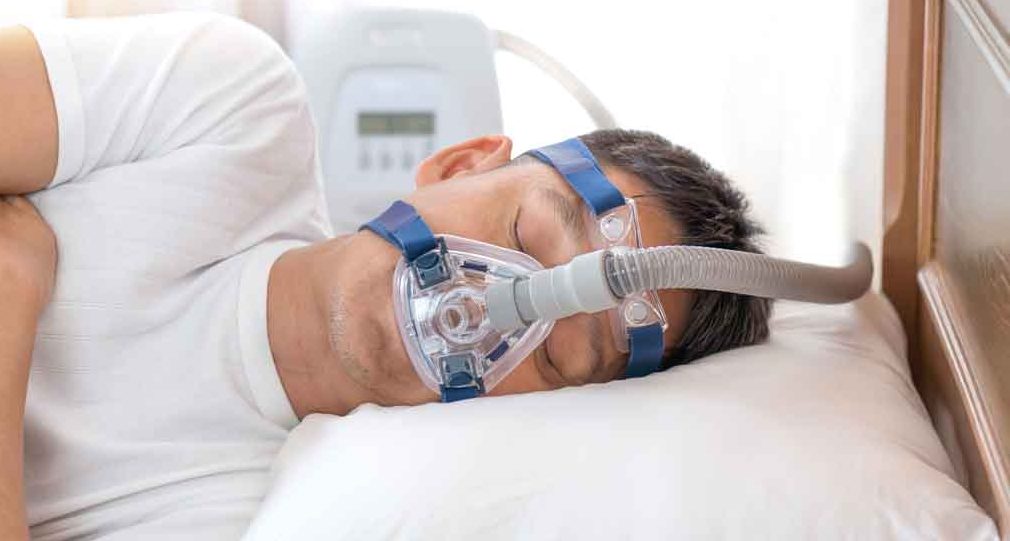Sleep Apnea Causes

Sleep apnea results when your airway narrows as you sleep. Learn what causes sleep apnea. If left untreated, it can lead to serious health complications.
Muscles in the back of your throat support the soft palate, tonsils, uvula (the triangle-shaped tissue hanging from your soft palate), your tongue, and the side walls of your throat. If those muscles relax too much when you sleep, your airway closes or narrows, and you can’t breathe adequately, causing obstructive sleep apnea.
Obstructive sleep apnea is the most common type of sleep apnea, followed by central sleep apnea, which results from irregularities in your brain’s normal signals that tell your body to breathe. Most people have a combination of both types of apnea, according to the National Institute of Neurological Disorders and Stroke (NINDS).
YOU MIGHT ALSO LIKE: Our Sleep Care section
Sleep apnea symptoms
If you have sleep apnea, you likely make choking, snoring, or gasping sounds in your sleep. When your airway is narrowed, your brain perceives you are having trouble breathing and wakes you. You then gasp to reopen your airway.
Waking moments may be frequent — five to 30 times an hour. While the interruptions are so brief you likely won’t remember they occurred, you may find you don’t feel rested in the morning. That common symptom of sleep apnea is often the result of lower than normal blood levels of oxygen.
Daytime sleepiness is a hallmark warning sign of sleep apnea, according to the NINDS. Other sleep apnea symptoms include:
- Morning headaches
- Irritability
- Forgetfulness
- Behavior or mood changes
- Anxiety
- Depression
Other conditions can cause those symptoms, so you should see a doctor for a correct diagnosis.
Sleep apnea causes
You can’t change some risk factors for sleep apnea. For example, men are twice as likely to have sleep apnea than women.
Increasing age also raises your risk for sleep apnea, as does a family history of the condition. You can inherit a naturally narrowed airway that can lead to sleep apnea.
Obstructive sleep apnea causes
- Obesity and being overweight. Increased fat deposits in your neck can block your upper airway during sleep, the National Heart Lung and Blood Institute (NHLBI) explains.
- Enlarged tonsils or adenoids. Tonsil or adenoid problems can cause sleep apnea in children, but enlarged, airway-blocking tonsils or adenoids can cause apnea at any age.
- Nasal congestion. Anatomical problems or chronic allergies can cause obstructive sleep apnea, blocking your airways during sleep.
- Neck circumference. People with thicker necks may have narrower airways that cause sleep apnea. The risk goes up for men if the neck circumference is 17 inches (43 centimeters) or more. In women, the risk increases if neck circumference is 15 inches (38 centimeters) or larger.
- Smoking. Smoking triples the risk of obstructive sleep apnea, compared to people who are non-smokers. Smoking may trigger inflammation and fluid retention in your upper airway. That risk may drop if you quit smoking, according to the NHLBI.
- Alcohol, sedatives, or tranquilizers. Alcohol and certain prescription drugs relax the muscles in your throat, resulting in obstructive sleep apnea.
Sleep apnea causes due to disrupted brain signals
- Cardiovascular disorders. People with heart failure are at especially high risk for central sleep apnea.
- Narcotic pain medications. Opioid drugs, particularly long-acting ones, increase the risk of central sleep apnea.
- Stroke. People who've had a stroke have an increased risk of central sleep apnea.
Complications of sleep apnea and treatment
Sleep apnea is considered a serious medical condition. If undiagnosed or untreated, it can result in health complications, including heart attack, glaucoma, type 2 diabetes, cancer, and cognitive and behavioral disorders, according to the NHLBI.
If you have signs and symptoms of sleep apnea, talk to your doctor about testing and treatment.
The Centers for Disease Control and Prevention notes lifestyle changes, including weight loss and gentle air pressure administered during sleep through a nasal continuous positive airway pressure device, are often effective therapies. Treating causes of sleep apnea, such as enlarged tonsils and allergies, is also important.
Updated:
August 08, 2023
Reviewed By:
Janet O’Dell, RN